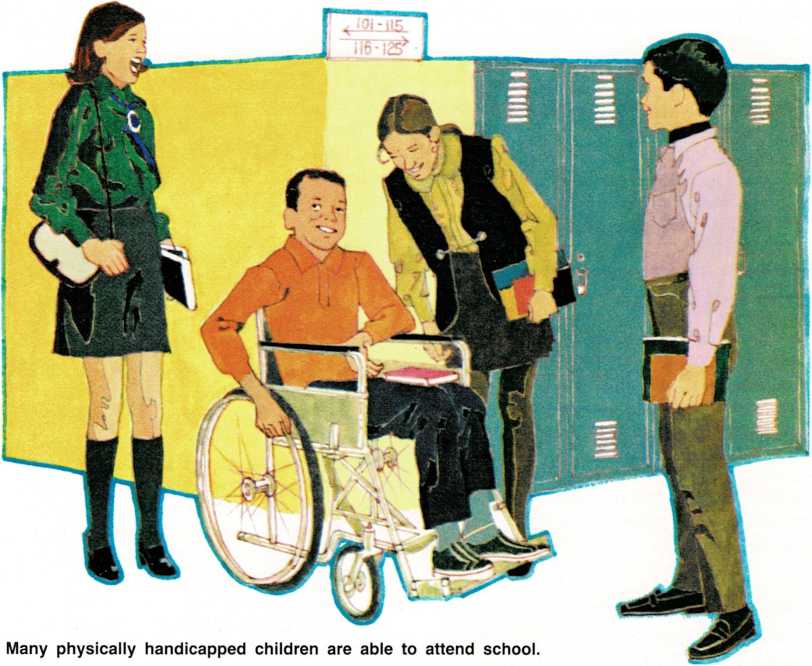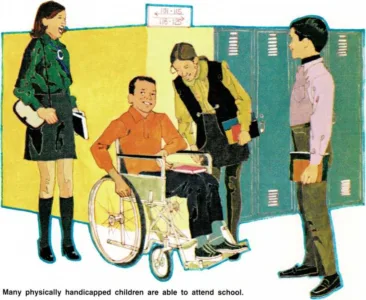The physically handicapped child
By Edward F. Lis, M.D.
Most physically handicapped children with normal intelligence have a
good chance for a useful and satisfying life, within limits. But their
parents must love and accept them, and help them develop self-confidence
by concentrating on what they can do rather than on what they cannot
do.
Many parents of handicapped children are overwhelmed by the
responsibility of caring for them. When problems become acute, they may
even begin to resent the children. Some parents feel guilty. Some,
ashamed of their handicapped children’s looks, make them feel unloved.
Feelings of guilt and resentment may cause parents to treat their
children in ways that are harmful to growth and development.
Some parents try to shield their handicapped children from situations
they think might cause hurt feelings. The result is that the parents do
things for their children that the children could do for themselves.
Such treatment can make children dependent and self-conscious.
Some parents go to the other extreme. They ignore disabilities and push
the children beyond their limits. If these children fail often, they may
be afraid to try anything, since they may not readily succeed.
Children who feel unloved because of their parents’ attitudes toward
them may become emotionally as well as physically handicapped.
Causes of some common physical defects
Parents of a handicapped child should have as much reliable information
as possible
about their child’s condition so that they know how to deal with the
child’s capabilities and limitations.
Physical defects may result from many causes and may involve any part of
the body. A child may be born with defects that stem from abnormal genes
passed on to the child from either or both parents at the time of
conception. Such hereditary defects may include cleft lip and cleft
palate, congenital heart disorders, improper closure of the spinal
canal, and various bone and joint disorders.
A child may be born with a physical defect if the mother had an
infection such as German measles during pregnancy, if she misused drugs,
or if she had toxemia (blood poisoning) during pregnancy.
Some physical defects result from premature birth or complications
during delivery. Such abnormal births do not always result in defects,
but they can cause cerebral palsy, epilepsy, hearing and seeing
difficulties, and developmental challenge.
Many children who are born with one or more physical defects may develop
further disabilities. For example, a child with a cleft lip and a cleft
palate may also have teeth and ear problems. A child with a hearing
defect may also have visual problems. Similarly, a child with defective
vision may also be hearing impaired.
Infection, an accident, or poor nutrition may produce physical
disability. For example, meningitis or encephalitis may cause brain
damage. A streptococcal infection may cause rheumatic fever and
rheumatic heart. An accident may cause paralysis or loss of

limb. A burn may cause disfigurement, and insufficient vitamin D may
cause rickets.
Treatment
Severe birth defects and acquired disabilities require the services of
specialists experienced in treating the particular defects. The family
doctor or pediatrician can best determine the appropriate specialist for
treatment and for continuing medical care.
Clubfoot and other bone and joint defects are treated by an orthopedist.
Facial defects, such as cleft lip and cleft palate, are treated by a
plastic surgeon. Brain and spinal cord defects are treated by a
neurosurgeon. Physical medicine is used to treat people with
neurological and muscular disorders. It includes physical therapy,
occupational therapy, special braces, and other means of improving
disorders without the use of drugs or surgery.
Caring for the handicapped child at home
The physically handicapped child has needs that go beyond special
medical attention to the defects. A handicapped child, like a normal
child, needs good nutrition and immunization against disease. The child
needs periodic visits to the family doctoi^-^ or the pediatrician. A
handicapped baby needs the same amount of cuddling and attention as a
normal baby. A handicapped toddler needs to explore, and the preschool
child who is handicapped should be stimulated with new experiences.
A handicapped child, like a normal child, must be given responsibilities
and tasks appropriate to age and ability. This gives the child the
feeling of being trusted and needed. A handicapped child also needs
discipline—neither more nor less than that needed by all children—to
learn the limits of socially acceptable behavior. Handicapped
children feel more secure knowing that they are expected to be as well
behaved as normal children.
Parents should refrain from rushing to help their handicapped children
do things they can do for themselves. But there is no harm in making
things easier for them. For instance, parents can alter clothes so that
children can dress and undress themselves with as little difficulty as
possible. They can arrange furniture so that the children can get around
the house more easily.
Depending on the nature of the handicap, a child may need additional
attention in the home. Parents may have to learn special skills and
techniques to cairy out treatment prescribed by the doctor. At times,
they may have to make changes in the home to accommodate a wheelchair or
other necessary equipment. Parents should not hesitate to inform their
doctor when problems arise in treating the child at home. The doctor may
be able to suggest ways to ease or correct the problems.
Educating the handicapped child
Medical treatment and special education during early childhood help many
physically handicapped children lessen or even overcome a handicap. For
example, special education can give the child with cerebral palsy a
chance to improve coordination and speech defects. It also provides the
opportunity for a physically handicapped child to relate to people
outside the family, and to learn to handle reactions to the handicap.
Some physically handicapped children can attend regular classes in a
private or a public school. Some public schools have classrooms adapted
to the special needs of handicapped children, and trained teachers to
instruct them. Some communities provide bus service for handicapped
children who\’ need wheelchairs, braces, or other equipment to get
around.
When a child is too severely handicapped to attend school, the public
school may send a teacher to the home, or it may provide electronic or
other teaching equipment. Residential schools may provide medical and
educational services in cases where parents are unable to cope with
handicapped children
at home, or where local facilities are either inadequate or nonexistent.
Such schools are similar to boarding schools in that the children may
return home for holidays and other school vacation periods.
Parents who want information about special educational services should
contact their school district or the division of special education in
their state.
Help for parents
The cost of providing treatment and special education for the
handicapped child may become a financial burden. Each state has an
official department that serves the handicapped and that has federal and
state funds to help parents in financial need or those who require help
in planning a program of education for their child.
Many agencies and groups that deal with handicapped children have
parent-education programs to help parents face problems and understand
their own attitudes. Lectures help parents understand the nature of
their child’s disability and its cause. Perhaps most important, parents
learn they are not alone when they share experiences with other parents
of handicapped children.
Parent-education programs are led by qualified people in the fields of
medicine and special education. Discussions, lectures, visual aids, and
trips to schools and institutions for the handicapped give parents
information on health care, discipline, and physical and psychological
adjustments necessary in caring for a handicapped child. Where such
groups do not exist, some agencies have mobile units to provide parents
of handicapped children with counseling.
A child like all others
In time, parents become aware that their handicapped children are in
most ways like all other children. They learn that other children have
similar handicaps and that their children need the medical and
educational services that are available to such children. Finally, the
parents of handicapped children discover that their children are
individuals in their own right.
Mark S. Puczynski, M.D. Consulting Editor

